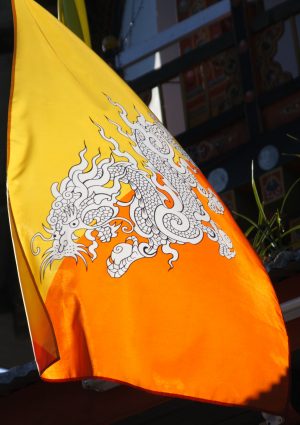Bhutan has attracted renewed geopolitical attention following the release of satellite images by U.S. satellite imagery provider Maxar Technologies in late October 2020, which depicted alleged Chinese construction activity on the Bhutanese side of the disputed border. While international media agencies raised questions about this, Vetsop Namgyel – the kingdom’s ambassador to India – intervened to deny the presence of a Chinese village situated within Bhutan’s borders.
In recent times, despite its overwhelming closeness to India, Bhutan has actively sought to pursue its own strategic imperative and push for its economic agenda, rather than simply acceding to international pressure.
The Treaty of Perpetual Peace and Friendship, agreed with India in 1949 and months before the 1950 Battle of Chamdo, following which communist China gained control over a region of Tibet for the first time, demonstrated Bhutan’s fears about China expansionist regional agenda. A 2007 revision clarified that “neither government shall allow the use of its territory for activities harmful to the national security and interest of the other.”
Having established guidelines to avoid threats to its sovereignty, Bhutan’s socioeconomic growth throughout the second half of the 20th century has been largely facilitated by Indian assistance, and as of 2020, it firmly remains the largest recipient of Indian foreign aid.
Indian Prime Minister Narendra Modi has appeared as an approachable figure to the Himalayan kingdom, repairing unexpected stiffness in the relationship caused by the previous government in New Delhi. Going beyond his famous “who will not want a friend and a neighbor like Bhutan?” remark during a state visit in 2019, Modi and India’s “Neighborhood First” policy has been crucial to the successful Bhutanese response to the coronavirus pandemic.
In July 2020, a route between India’s Jaigaon and Bhutan’s Ahllay was opened to improve trade connectivity to the landlocked region, while October 2020 saw the delivery of training, hospital machinery and medicine – along with an agreement for collaboration on the Phase-3 trials of a COVID-19 vaccine candidate.
As the Bhutanese economy waned, India restarted agricultural imports to its northeast, with Modi calling the relationship his “top priority.” India have also diversified its assistance to Bhutan in the recent months, notably through a fintech initiative via the implementation of the RuPay card, and a space technology initiative which involves training Bhutanese personnel and sending Bhutan’s satellite into space with the help of the Indian Space Research Organization (ISRO).
The special relationship is unlikely to face major challenges in the coming years unless Bhutan senses a clear and obvious threat through expansionist propaganda from its neighbors.
At the Global Environment Facility (GEF) meeting in June 2020, China laid claim to the Sakteng Wildlife Sanctuary, a protected site situated in Bhutan’s eastern district of Trashigang under consideration for UNESCO inclusion. In reply, Bhutan announced it “rejects the claim,” adding that the sanctuary was “integral and sovereign territory of Bhutan and at no point during the boundary discussions between Bhutan and China has it featured as a disputed area.” Notably, Bhutan – which does not have diplomatic ties with China – has also largely steered clear of involving itself in the Belt and Road Initiative (BRI), a proposal that had successfully tempted all of India’s other neighbors in the subcontinent.
However, some Bhutanese commentators have speculated about a slowly-changing stance, referring to Bhutan’s apparent cartographic ceding of its tallest peak, Kulakangri, to China in the late 2000s, and an increase in meetings between Bhutanese politicians and their Chinese counterparts – most notably on the side-lines of the Rio+20 summit in 2012.
There have also been concerns about complications related to Bhutan’s long-term stagnating economic growth, rising youth unemployment, and foreign debt owed to India. Reports have suggested that youth frustration has been fueled by the increased number of business and academic opportunities being offered in China to young people from Bhutan. Likewise, as tourism from China begins to challenge Bhutan’s economic revenue from hydropower exports to India, critics have written about the hurdles that the special relationship brings to potential Bhutanese economic prosperity.
Distancing itself from the image of being a geostrategic tool, to its credit, Bhutan has daringly pursued its own route where required. Although progress has recently stalled on World Trade Organization accession, a series of diplomatic friendships and independent policy moves towards economic liberalization and private sector development, were pursued by the country since the early 2000s. Likewise, the unique, nationally established philosophy of Gross National Happiness – famously advocated by former king Jigme Singye Wangchuck – arguably serves as Bhutan’s identifier to the world.
Seven years since its last bilateral tie-up, Bhutan established diplomatic relations with Germany in November this year, Prime Minister Lotay Tshering’s efforts to open up the country were widely praised. The signing of a preferential trade agreement with Bangladesh is scheduled this month, while Japan continues to provide economic cooperation through giant infrastructure projects. Furthering its aim of financial independence, Bhutan also announced the issue of its first sovereign bond in September, with the aim of diversifying resources to support economic recovery.
In spite of the developments, Bhutan has, largely, loyally maintained commitment to its foreign policy status quo for decades, respecting the conditions described in the 1949 treaty with India, and then supplementing it with more modern demands during the 2007 revision. Thus, despite diversifying international bilateral ties, Bhutan will politically continue to consider India as its only major strategic ally.
Prin Shasiharan is a London-based lawyer with experience in regulatory roles at international organizations including the United Nations and the Council of Europe. He completed his law degree at the London School of Economics (LSE), and later gained a Master’s degree in Corporate Law at University College London (UCL). Prin primarily focuses on areas including economic crime and corruption, with occasional contributions on geopolitical issues concerning South Asia.

































